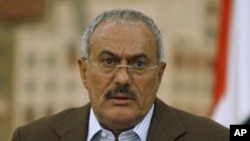Amid defections by military commanders and former political allies, Yemen's president is warning that any attempt to stage a coup against him will lead to civil war. But he also says he is willing to hold early elections and leave office by January in an orderly transition of power, as protests intensify against his 32-year rule.
Tens of thousands of Yemenis are occupying central squares in cities and towns across the country, as former allies of President Ali Abdullah Saleh move to pledge allegiance to a popular uprising against him.
Lashing back at the growing rebellion, President Saleh told a group of army commanders Tuesday that he is holding firm and that any sort of coup would lead to civil war:
He says no one should expect to come to power through a coup. Everyone must stop and realize that people are armed, and no one can defeat anyone. The time of coups, he insists, has ended. He says if someone wants to come to power, that person must follow a democratic and civilized path.
The president’s insistence that he will not step down immediately followed reports that the key presidential guard, commanded by his son, and special forces units under his nephew, continue to defend the presidential palace.
Tank crews loyal to General Ali Mohsen al-Ahmar, who pledged allegiance to the rebel movement Monday, control the central bank and other key government buildings in Sana'a. Most of Saleh’s Cabinet has resigned or been dismissed, although Defense Minister Mohammed Nasser Ahmed remains loyal to the president.
Saleh alleged in his speech that Yemen's "youth revolution" is being manipulated by veteran politicians with an agenda.
He asserts that the young people supporting the youth revolution are victims of old politicians whose goal is to gain power and who won’t stop at anything to reach that goal. He complains that the country is torn by numerous conflicts and that his rivals are vying with one another to revolt.
Princeton University Yemen scholar Gregory Johnsen argues that President Saleh is losing support quickly and that it is unlikely that he will be able to win back those who have defected:
"The army officers who have announced their support for the protesters aren't going to rejoin the president,” Johnsen said. “They are not going to come back into the fold. But a lot is going to depend on how loyal units of the Republic Guard are to the president's son as well as how loyal members of the central security forces are to his nephew."
Johnsen says the outcome may rest on a last-ditch round of mediation by Saudi Arabia. President Saleh dispatched Prime Minister Abu Bakr al Qurbi to Riyadh Monday evening to enlist Saudi help in brokering a solution to the nearly five-week-old crisis.
Yemen's President Warns Coup Would Lead to Civil War




